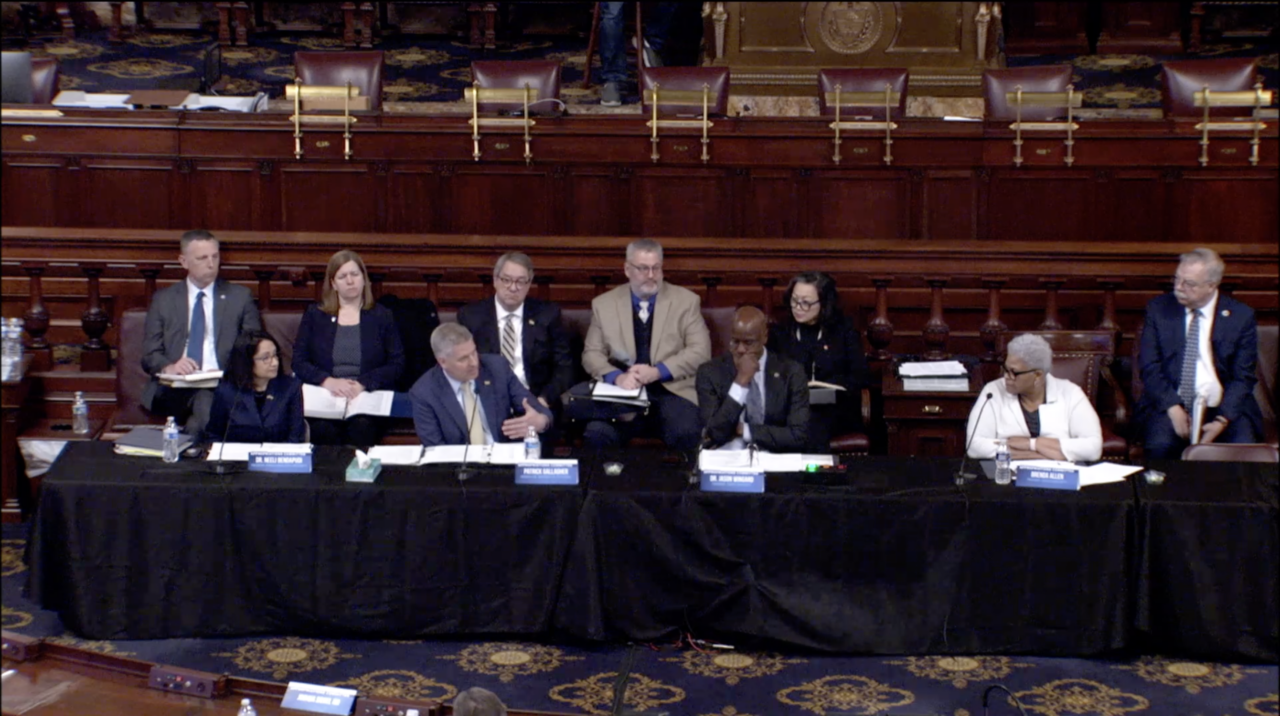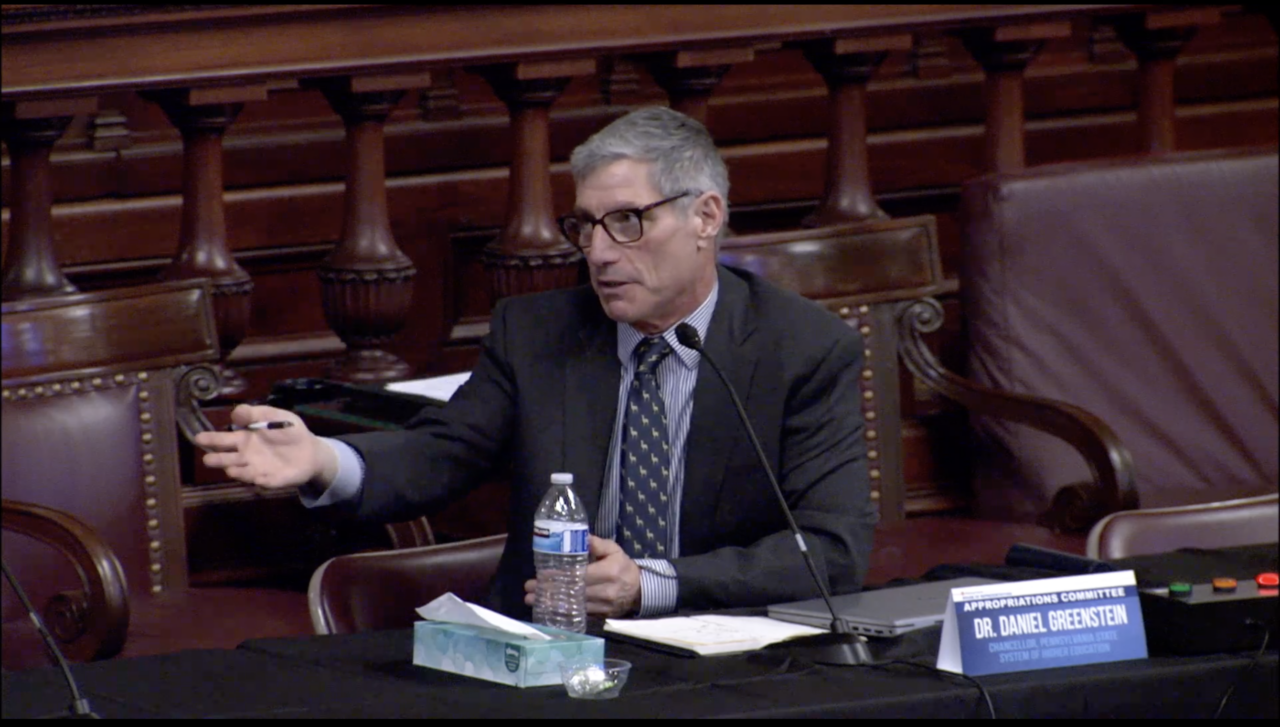
FILE - Shown is the Pennsylvania House of Representatives on Jan. 5, 2021, at the state Capitol in Harrisburg, Pa.
Laurence Kesterson / AP Photo

FILE - Shown is the Pennsylvania House of Representatives on Jan. 5, 2021, at the state Capitol in Harrisburg, Pa.
Laurence Kesterson / AP Photo

Laurence Kesterson / AP Photo
FILE - Shown is the Pennsylvania House of Representatives on Jan. 5, 2021, at the state Capitol in Harrisburg, Pa.
State House and Senate lawmakers began hearing funding pitches from people representing the state’s agencies, programs and services this week. The annual budget hearings will form the basis of budget talks later this year, the majority of which typically happen behind closed doors.
Higher education has been a focal point of talks in the House so far. The four state-related universities, 10 other state-owned System of Higher Education schools, and community colleges are each asking for funding increases.
Gov. Josh Shapiro has indicated support for that. When he unveiled his $44 billion state spending proposal earlier this month, Shaprio said he wanted to give Pennsylvania’s public colleges and universities a $60 million funding boost this year.
Under that plan, the University of Pittsburgh as well as Penn State, Temple and Lincoln Universities would get around $39 million of that increase, or around two-thirds. Former Gov. Tom Wolf approved a similar amount of money for those schools in last year’s budget, crafting a one-time stimulus package from $40 million that he controlled. The State System, meanwhile, would get $11 million, while the state’s 15 public community colleges would split a $5.1 million increase.
“Why [should] special and additional money go to the state-related universities as opposed to the PASSHE [State System] schools?” Rep. Eric Nelson (R-Westmoreland) asked the four university leaders who testified Tuesday.
Most of those leaders dodged the question, deferring instead to lawmakers.
“It’s not my role to tell you as a lawmaker how to make relative investments across the different parts of the Commonwealth’s system of education,” Pitt Chancellor Patrick Gallagher said.

Pennsylvania House of Representatives
From left, leaders from Penn State, the University of Pittsburgh, Temple University and Lincoln University testify at a House Appropriations committee hearing in Harrisburg on March 22, 2023.
Other lawmakers asked schools like Pitt and Penn State whether they’re attracting enough in-state students and keeping their costs low enough to justify higher funding. One, Rep. Justin Fleming (D-Dauphin), asked if Penn State could use some of its $4.5 billion endowment to pay for some of its costs.
Penn State President Neeli Bendapudi explained most of that money is already committed to scholarship funds, building projects, and other efforts. She estimated less than one percent, or $350 million, is free to use.
“We can’t just spend it on whatever we want,” Bendapudi said, noting that Penn State uses 5 percent of any money it makes on its investments for student scholarships.
Bendapudi and others held up their school’s huge medical research departments as prime reasons for higher funding. Any new funding, they argued, would benefit research that could become commercially viable and help place graduates in high-demand job fields like nursing.
“We were created specifically for the economic development, the workforce development [and] the competitiveness of our state relative to all of our neighbors,” Bendapudi said.
Temple University President Jason Wingard added his university’s medical system is serving low-income households in Philadelphia and attracting federal grant money.
“The work that we are doing on the ground for our community that satisfies our mission is really an economic engine for the whole state,” Wingard said. “We are teaching, we are learning, we are providing resources and we are providing care for those who otherwise wouldn’t have it.”
State-related university funding has been a major sticking point of state budget negotiations in the past few years. It may be one again this year, since each of the four universities hinted they might raise tuition prices even if they receive more funding.
State System of Higher Education Chancellor Daniel Greenstein painted a similar picture for House lawmakers Wednesday, saying the system could hike tuition for the first time in five years if lawmakers don’t approve a nearly four percent funding increase.

Pennsylvania House of Representatives
PASSHE Chancellor Daniel Greenstein testifies at a House Approrpriations committee hearing on March 22, 2023 in Harrisburg.
“We’ve been through a dozen years of recession management, COVID, and a few of our universities are going through integration, which I can tell you for a fact is not easy,” Greenstein said in his typically-frank fashion. “They’re tired. They need help.”
The State System got a $75 million dollar funding boost last year, which Greenstein said went a long way to keeping it afloat. The chancellor added PASSHE’s recent consolidation of six of its schools into two is, among other things, helping it to keep tuition at just over $7700 per year for in-state students for the past four years.
Ideally, Greenstein said he’d like state lawmakers to give the 10 State System schools around a collective $20 million, or 3.8 percent, funding boost and include another $112 million for student scholarships.
The chancellor, who has helmed the State System since 2018, has repeatedly said schools such as Millersville and Slippery Rock Universities could graduate more students into fields like teaching, nursing and engineering if lawmakers contributed more money.
Greenstein added he and other leaders would use higher state funding to help reduce attendance costs for low and middle-income students.
“You sort of get what you pay for,” Greenstein said. “If you want robust communities with economic impact stemming from their universities, you can’t have it with [low] public investment.”
Gov. Shapiro, meanwhile, wants to present to lawmakers a “comprehensive” plan to overhaul Pennsylvania’s higher education system by next year. Each of the people who testified in the House this week said they are “looking forward” to meeting with policymakers to that end over the next year.

Get insights into WITF’s newsroom and an invitation to join in the pursuit of trustworthy journalism.
The days of journalism’s one-way street of simply producing stories for the public have long been over. Now, it’s time to find better ways to interact with you and ensure we meet your high standards of what a credible media organization should be.